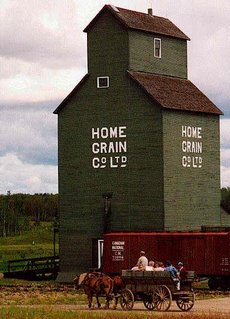That runs counter to the propaganda of the Harpocrites that farmers want an open market. American farmers who suffer from Agribusiness domination of the market like Canadian farmers recognize that a Marketing Board is the better option. Because as we all know consolidation creates better market access in the capitalist market.
As Marx said; That production rests on the supreme rule of capital. The centralization of capital is essential to the existence of capital as an independent power.
The Nebraska Wheat Growers Association, formed in 1954 and based in Ogallala, plans to move its office to Lincoln, as part of a proposed merger with the Nebraska Wheat Board. "The proposal, under discussion for about a year now, is aimed at improving the efficiency of both groups and making promotion of wheat more effective," says Mike Sullivan, NAWG president and producer from Wallace. "It will also make lobbying efforts on behalf of wheat growers more effective with NAWG being based in Lincoln near the Legislature." The Nebraska Wheat Growers Association is a dues-paying, voluntary membership organization that represents the state's producers, including lobbying for them on state and national policy issues. It sets membership policy on such matters as the farm program, crop insurance, soil and water conservation, transportation, and environmental issues. The Wheat Board, on the other hand, consists of a seven-member board, appointed by the governor, that administers the 1-1/4-cent-per-bushel wheat checkoff fee paid by all Nebraska wheat growers. The checkoff was created under state law and as such the board is prohibited from lobbying on state issues, although it can do so on national issues. The board's responsibilities are allocating checkoff dollars for research, promotion, education and market development, says Royce Schaneman, executive director of the Wheat Board.
See:
Death of the Family Farm
Wheat BoardCanada, agriculture, wheat, WTO, G8, WheatBoard, farmers, Western-Canada, barley, wheat, Strahl, Government, Conservatives, Harper,
Canada
Politics
Harper
CWB
Wheat Board
farming
Supply Side Management
Conservatives


![[bannedsm.gif]](https://blogger.googleusercontent.com/img/b/R29vZ2xl/AVvXsEiBep3NLWfUuQ0x1dpQFcnsKqWC2QIuxWMzY2_gMoG10hcNUkL_4Uy10zjfM2-UvS4Q26LOPJzXjGkJHRxSmrFHt3mngXuiLMkyUar_aHXLQjd8pXKw53VDtLRUvSjl12ZRcdrwyw/s1600/bannedsm.gif)


